LATEST INSIGHTS
Your Present Location: LATEST INSIGHTSRDCY's latest research outcomes as Ukraine crisis enters 3rd year
On February 21, 2024, sponsored by the Chongyang Institute for Financial Studies at Renmin University of China (RDCY), organized by the Global Governance Research Center at Renmin University of China (GGRC), the China-Russia People-to-People Exchange Research Center at Renmin University of China, and co-organized by the School of Global and Area Studies at Renmin University of China, the Tenth Global Governance Forum (2024 Spring) on “The Second Anniversary of the Russia-Ukraine Conflict: Impacts and Insights” was held successfully in Beijing, with 3 significant research reports releasing. Zheng Xinye, Vice President of Renmin University of China (RUC) and Executive Director of RDCY, and Yang Qing, Counselor of the Department of European-Central Asian Affairs of Ministry of Foreign Affairs, attended the forum. Nearly 100 attendees were present, including over 10 diplomatic envoys and foreign journalists from the United States, Russia, Britain, Germany, Iran, Vietnam and other countries. More than 30 Chinese and foreign media outlets, including Xinhua News Agency, China News Service, Qian Xian Magazine, Jiefang Daily, Beijing Daily, Global Times, CGTN, Phoenix TV, Shenzhen TV, Hubei TV, Guancha Syndicate, Cover News, South China Morning Post, RIA Novosti, Russia Today, and others, participated in this event and provided coverage. More than 150,000 people watched the live broadcast on multiple platforms across the Internet.
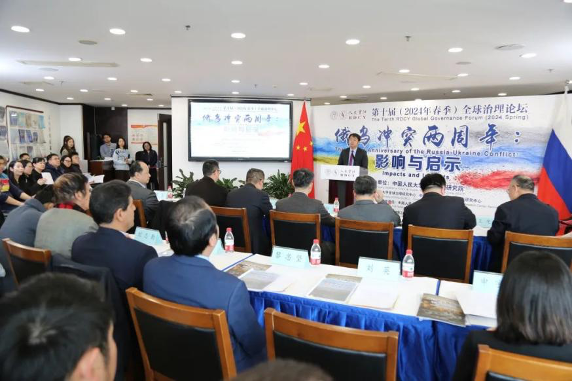
Zheng Xinye, Vice President of Renmin University of China (RUC) and Executive Director of RDCY, said that February 24, 2024 marks the second anniversary of Russia's special military operations in Ukraine. During the past two years, the Russia-Ukraine conflict has profoundly affected the evolution and changes of the global landscape and global order, with enduring implications for the future. It can be argued that the outbreak of the Russia-Ukraine conflict signifies the end of the Post-Cold War era and the beginning of a new era. The world has entered a period of great changes unseen in a century, starving for new ideas, new trends of thought, and new ways of thinking. Today, the seminar is just in time as it brings together top experts worldwide at RUC to jointly explore the logic behind the Russia-Ukraine conflict and potential resolutions on the occasion of the 2nd anniversary of this crisis, which will enable us comprehend the distinctive features inherent in extreme circumstances while evaluating diverse response strategies, and ultimately fostering an environment conducive to constructing a new world founded upon lasting peace, universal security, shared prosperity, openness, inclusiveness, cleanliness and beauty.
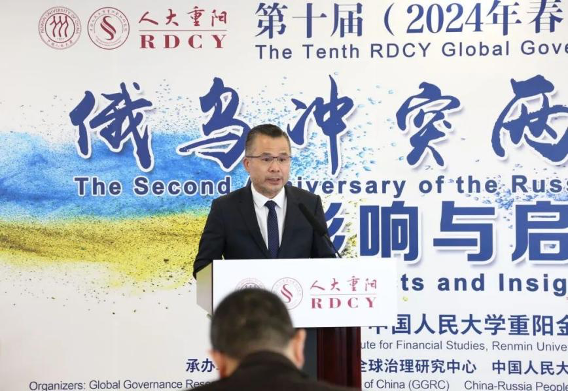
Yu Hongjun, Former Vice Minister of the International Department of the CPC Central Committee, delivered a keynote speech entitled 'Enhancing China's Role in Global Governance: Insights and Reflections'. He presented four key points on China's comprehensive engagement in global governance as well as China-Russia collaboration in expanding and deepening global governance. Firstly, China's active involvement in global governance is a conscious response to the demands of our time. Secondly, China's participation in global governance is a common governance in which developing countries play a constructive role. Thirdly, China's participation requires clear objectives and concrete actions. Lastly, there exists significant potential for fruitful outcomes through joint efforts between China and Russia in participating actively global governance.
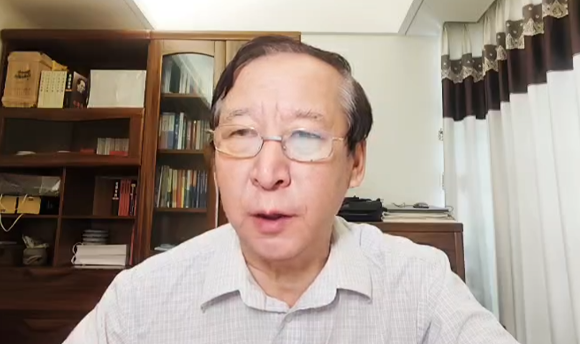
Afterwards, Wang Wen, the executive dean of RDCY, released three major research reports subsequently which are China’s Proactive Role in the Reshaping of Russia’s Future: A Think Tank Report on 5 In-Depth Visits of 21 Cities in Russia and Crimea Since 2022, The Second Anniversary of the Russia-Ukraine Conflict: Impacts and Insights, and After Divestment: Foreign Enterprises in Russia, Russia's Response and Implications for China.
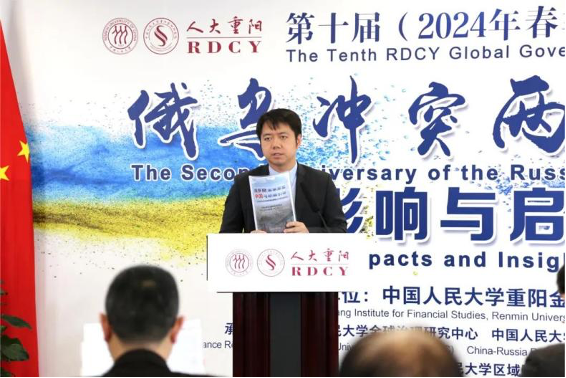
The report titled 'China’s Proactive Role in the Reshaping of Russia’s Future: A Think Tank Report on 5 In-Depth Visits of 21 Cities in Russia and Crimea Since 2022' was authored by Wang Wen. The report assesses the current situation in Russia, analyzes the impact of the Russia-Ukraine conflict, summarizes the shortcomings and potential of China-Russia cooperation, and puts forward ten recommendations for comprehensive collaboration between China and Russia. From a scholarly perspective, the report was written on the basis of his personal experiences after visiting 21 cities in Russia and Crimea such as Moscow, St. Petersburg, Murmansk,etc. Based on his perceptions after conducting extensive practical investigations in Russia’s politics, economy, society and science and technology, and considering the performance of the Russian military and public data since the Russia-Ukraine conflict, it is briefly concluded that Russia is a first-class power in diplomatic power, energy and talent, a second-class country in conventional arms and intelligent technology, and a third-class country in economy and infrastructure.
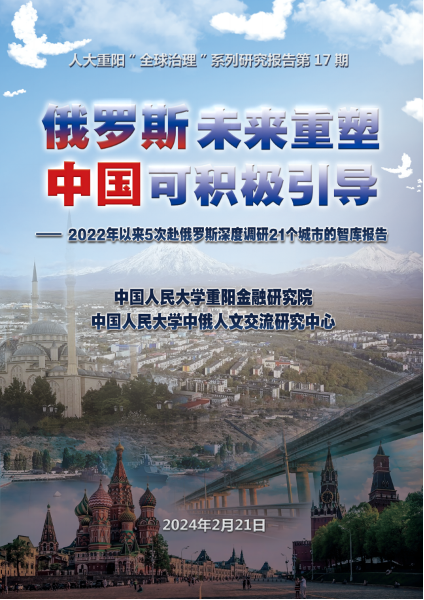
The report titled 'The Second Anniversary of the Russia-Ukraine Conflict: Impacts and Insights” was authored by RDCY Research Group on Russia-Ukraine Conflict. The report highlights that the Russia-Ukraine conflict, being the most significant international event since the Cold War, has had and will continue to have a profound impact on the evolution of the global landscape and changes in the global order. It points out ten major impacts of this crisis in global security, society, regulations, politics, ideologies, economy, science and technology, energy, finance, and global landscape, and eight insights for China. The report emphasizes that for China, it is necessary to grasp the main characteristics and medium- and long-term trends of the era under the Russia-Ukraine conflict, and fully respond to them both at home and abroad.
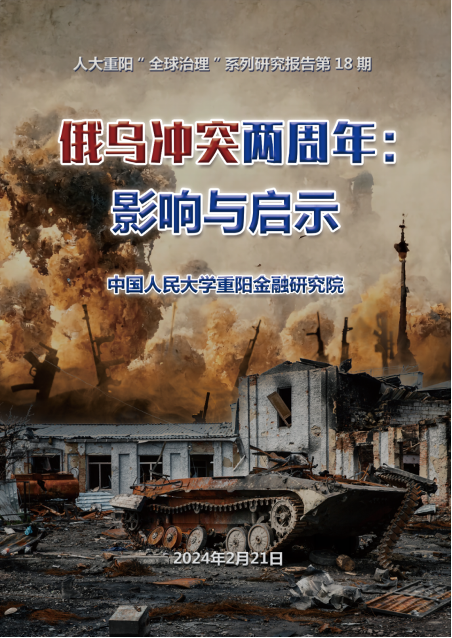
The report titled 'After Divestment: Foreign Enterprises in Russia, Russia's Response and Implications for China” was authored by the School of Global and Area Studies at RUC. The report conducts a statistical analysis of the withdrawal of Western companies from the Russian market and highlights that the majority of companies withdrawing from Russia are from the United States and its allies. The retention rate of foreign companies is influenced by public attitudes towards Russia, profitability in Russia, and asset categories. The report emphasizes that the pressure from public opinion, economic sanctions, and military conflicts have impeded foreign company operations in Russia. In response to these challenges, although the Russian government has implemented various measures to mitigate the impact of foreign divestment, obstacles still remain. Based on the analysis, it can be concluded that such foreign divestment may not necessarily be detrimental to Russia's economy, which depends on the substitutability and substituting efficiency of the industry in which they operate. The report suggests that China should enhance economic cooperation with Europe while remaining steadfastly open to global engagement, underscoring the importance of public opinion, and reevaluating interdependence with Western countries and specifically with the United States.
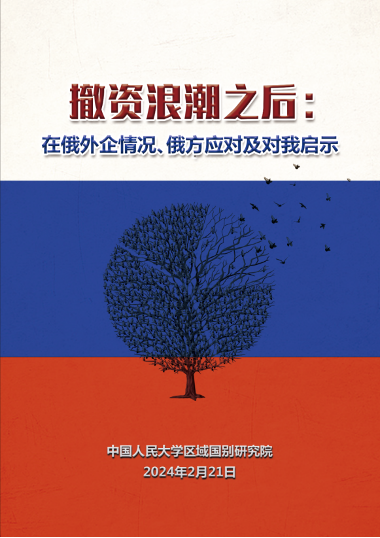
In the subsequent thematic discussion session, Sun Zhuangzhi, Director of the Institute of Russian, Eastern European and Central Asian Studies at Chinese Academy of Social Sciences (CASS), Li Ziguo, Director of the Department for European-Central Asian Studies at China Institute of International Studies (CIIS), Ding Xiaoxing, Director of Institute of Euraisan Studies at China Institutes of Contemporary International Relations (CICIR), Ding Yifan, Former Deputy Director, Institute of World Development at Development Research Center of the State Council (DRC), Wang Xianju, Deputy Director of Center for Russian Studies at Renmin University of China-Saint Petersburg State University, Liu Zhiqin, Senior Fellow of RDCY, and Liu Ying, Director of Cooperative Research Department and Research Fellow of RDCY, shared their perspectives successively. The session was moderated by Shen Yujing, Associate Research Fellow of RDCY.
Sun Zhuangzhi believes that the international landscape has undergone significant changes due to the impact of the Russia-Ukraine conflict: Firstly, Europe has witnessed a process of blocification. The post-cold war era has ended, the process of globalization has been hindered, Europe is fully leaning towards the United States, and the geopolitical game among major powers has entered a new stage. Secondly, the expansion and Asia-Pacificization of NATO has led to a more complex security situation. Thirdly, there is a generalization of security concerns with energy and food security issues becoming more prominent alongside amplified non-traditional security challenges and an elevated risk of nuclear insecurity. Fourthly, new trends in multilateral cooperation have emerged characterized by reduced investment in multilateral mechanisms, increased exclusivity, and heightened bloc politics. Fifthly, profound adjustments have occurred in relations among major powers. Sixthly, conservatism and populism exert influence on the trajectory of international relations.
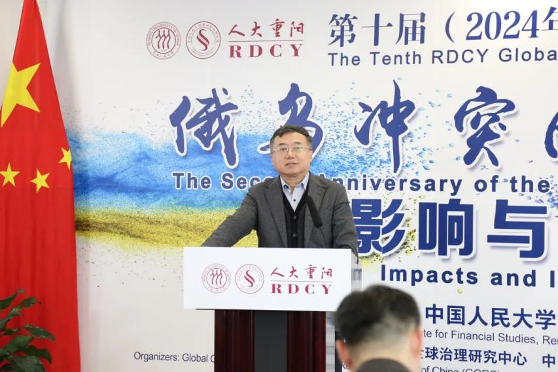
Li Ziguo argues that the second anniversary of the Russia-Ukraine conflict demonstrates that a war of attrition is too much for both sides to bear, but it has to be fought. While Russia is gradually gaining military advantages, it becomes increasingly apparent that all three parties are shifting from defensive strategies to seeking changes. The year 2024 is a crucial year, but not a decisive one. Ukraine cannot win as the United States is unwilling to accept defeat, and Russia cannot afford to lose. Presently, the domestic situation is more favorable to Russia. The impact of the Russia-Ukraine conflict on international relations can be observed as below: firstly, impact one the international financial system, especially the decline of credit of the US dollar; secondly, security has surpassed development as a paramount consideration in international relations; thirdly, there is an increasing influence from Global South countries; fourthly, there is a resetting of energy patterns; fifthly, there is a collapse in arms control systems.
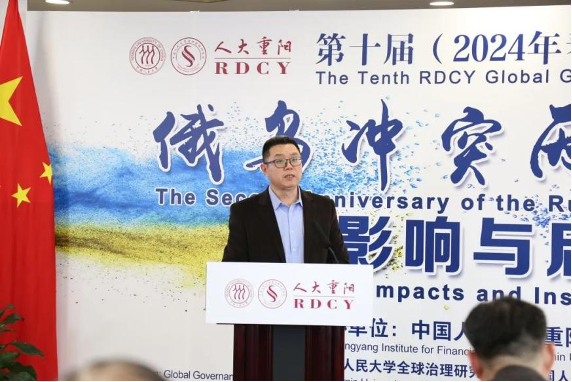
Ding Xiaoxing stated that the Russia-Ukraine conflict has brought more uncertainties, confrontation between camps, various security risks, and the degradation of global governance to this turbulent world. However, it is important to note that since 2023, China has emerged as the most important of factor in upholding global peace and development. The recent Central Conference on Work Relating to Foreign Affairs has conveyed a clear trajectory: China's policy remains clear and consistent, with an ongoing commitment to promoting the building of a community with a shared future for mankind. With the gradual deepening of the profound changes unseen in a century, China has indeed become the most important force for maintaining global security and stability.
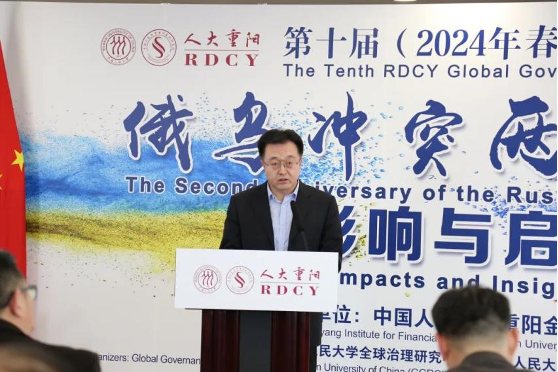
Ding Yifan emphasized that after the outbreak of the Russia-Ukraine conflict, there have been many economic sanctions and counter-sanctions. It is very necessary for China to learn from Russia’s experience on those issues. Firstly, it is noteworthy that despite the conflict, the Russian economy managed to achieve a counter-trend due to its independent decision-making process without Western influence. Secondly, it is imperative to maintain complete industrial and supply chains, and make economic preparations for potential wars. Thirdly, expanding circle of friends with non-Western countries plays an extremely important role in ensuring secure international trade and smooth transactions. Lastly, reducing reliance on Western currencies such as the US dollar and Euro becomes essential in order to guarantee unhindered global trade and cross-border payments.
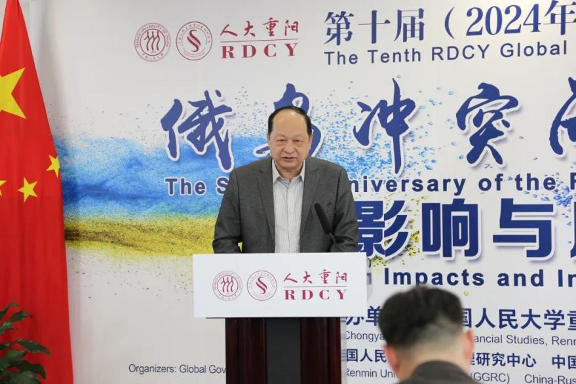
Wang Xianju asserts that the Russia-Ukraine conflict has has a serious impact on the process of Eurasian integration in the past two years. This is primarily manifested in the setbacks faced by Russia-led organizations such as Commonwealth of Independent States (CIS) and Eurasian Economic Union (EEU), the decline of Russia’s influence in Eurasia, sluggish progress in union integration, and an unprecedented intensification of the game among the United States, Europe, and Russia in Central Asia. Not to be outdone, Russia strives to maintain its advantages in Eurasia, as well as actively promoting the Shanghai Cooperation Organization (SCO) expansion. In light of this situation, China should deepen cooperation in Eurasia integration, the interconnection of the Silk Road Economic Belt and the Eurasian Economic Union, and the development of the SCO, continuously strengthen external communication, tell China's stories well, do a good job of people-to-people exchanges, and strive to play a greater role in international affairs.
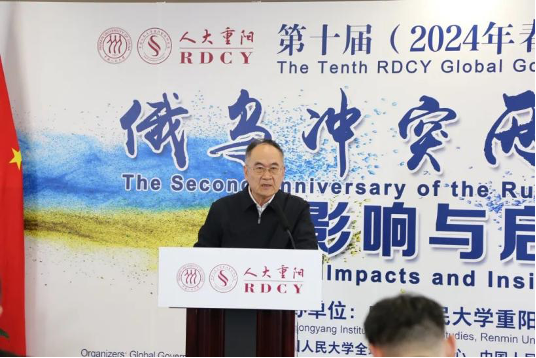
Liu Zhiqin believes that in 2023, there are two surprises for people: One is that the conflict between Russia and Ukraine are lasting for so long; the second surprise is that neither side has enough ability to defeat the other side alone. Maybe it is because of these two 'surprises' and the related problems that the mainstream mood at the Munich Security Forum has become pessimistic, with many political observers drawing a pessimistic conclusion that the Russia-Ukraine conflict is a 'lose-lose'. To change from 'lose-lose' to 'win-win' requires a variety of internal and external factors to work together, otherwise, it is not easy to change the possibility of 'lose-lose'.
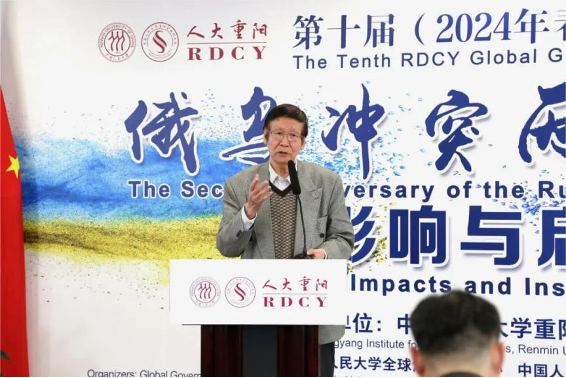
Liu Ying conducted a data-driven analysis of the unprecedented sanctions and impacts resulting from the Russia-Ukraine conflict. She asserts that in this conflict, the Western countries have imposed an unparalleled number of sanctions on Russia, totaling nearly 20,000 items. The United States, Canada, and Switzerland jointly account for 53% of these sanctions, and the EU, Britain, and France collectively contribute to another 32%. The main sanctions on Russia are financial sanctions, including the removal of SWIFT. The consequences of these sanctions are twofold: firstly, they expedite the restructuring of global landscape with rising international influence in the Global South and East alongside a decline in Western dominance, and rising of BRICS. Secondly, they lead to an unprecedented reshaping of the international order. Behind the Russia-Ukraine conflict lies a geopolitical game between the United States and Russia. Thirdly, these sanctions have significant implications for restructuring the international financial system by impacting both dollar creditworthiness and U.S. credibility while also shaking up petrodollar foundations through fluctuations in oil and gas prices denominated in rubles. Fourthly, there is ongoing restructuring of global production and supply chains. Lastly but importantly, climate change is being accelerated due to increased carbon emissions caused by planes rerouting around Arctic airspace as a consequence of these sanctions.
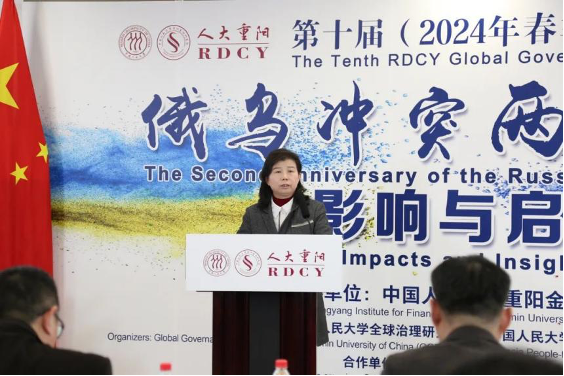
The session was moderated by Shen Yujing, Associate Research Fellow of RDCY.
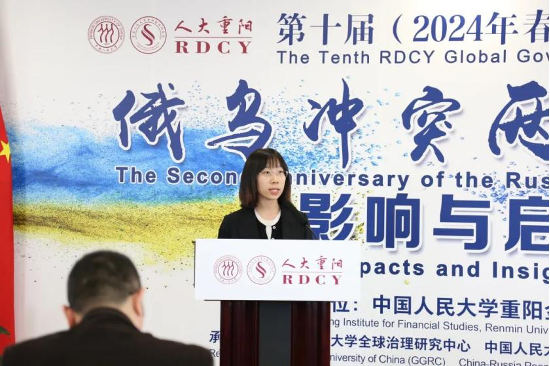
Key Words: RDCY Report, the Russia-Ukraine Conflict























































































 京公网安备 11010802037854号
京公网安备 11010802037854号





